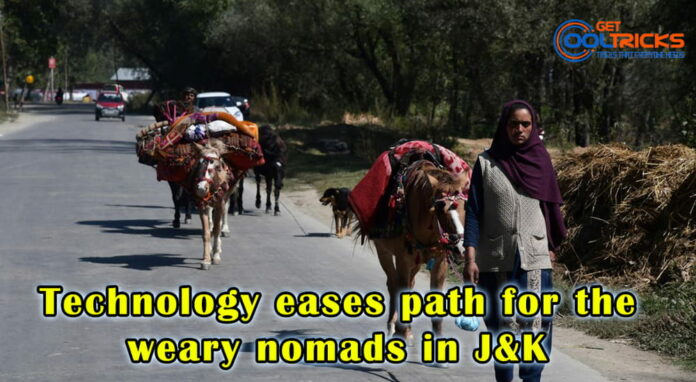Jammu and Kashmir’s nomadic community, known as Gujjars and Bakarwals, have been offered smart cards and free transport to aid their biannual migration.
News
- For centuries, Jammu and Kashmir’s nomadic community, known as Gujjars and Bakerwals, undertake arduous journeys on foot as part of their seasonal migration to find better pastures for their livestock.
- They often lose cattle and, on occasion, family members to accidents and hardships along the way.
- However, technological solutions and transport services have been offered by the UT administration this year to help them cover long distances in less time and more safely.
About the Initiative by the Government
- J&K’s Tribal Affairs Department had surveyed 98,000 Gujar-Bakarwal families to map their routes and transit locations.
- Using remote sensing technology and geographic information system, officials delineated pastures and the grazing land in each district.
- This step was followed by mapping of routes and the migration pattern to understand when Bakerwals and their livestock use the highways.
- The Tribal Affairs department also collaborated with the Forest Department and the Census Operations Department to provide smart cards to tribal families.
Use of Smart Cards
The smart cards will replace the current requirement multiple permissions and offer a unified central database to all the organisations and agencies for smooth and hassle-free movement of families during the biannual vertical migration.
Embedded with a chip, the smart card contains demographic details, transit routes, originating place, destination and other vital statistics.
A pilot project will cover 10,000 families over the next three months.
About Gujjar-Bakarwal community
- The nomadic pastoralists of Jammu and Kashmir, also known as the Gujjar-Bakarwal community are a transhumance community of the Himalayas.
- Gujjar and Bakarwals are the third largest ethnic group in J&K constituting more than 9% of the total population of the union territory.
- Around 99.3 per cent population of Gujjar and Bakarwals in J&K follow Islam.
- They were given the status of a Scheduled Tribe in 1991.
Gujjars- The Gujjars are traditionally called as Goajar, Gujar and Gurjara.
- They have their own dialect GOJRI which is a branch of Indo-Aryan dialect and have their own particular customs, workmanship and specialty.
Bakarwals
- The term Bakarwals derived from the combination of two terms “Bakri” means goat/ sheep and “wal” meaning “one who take care” of essentially the name “Bakarwal” implies high altitude goats and sheep herders.
- Bakarwals are primarily pastoral nomads rearing goats and sheep in high altitude of Great Himalayan during summers and spent their winters in plains and foothills of Shivaliks.
Biannual Migration
- They undertake a biannual migration with their flock between the pastures of Kashmir and Ladakh during summers, and the plains of Jammu in winters.
- Historically, they have been known for their immense knowledge of the ecosystems that they traverse.
- Across their migratory routes, their daily activities benefit the environment as they –
- Conserve local soil and water,
- Seasonally maintain the grasslands,
- Regulate the frequency of forest fires by limiting excessive growth, and
- Keep invasive plant species in check by weeding them out.
Challenges faced by the community
- Gujjar-Bakarwal Tribe of J&K is one of the most backward of all tribes of J&K.
- Most habitation areas of Gujjar Bakarwals tribe in Jammu and Kashmir are lacking in facilities like –
- Road communication, electricity, water supply schemes, medical facilities and educational facilities which put Gujjar Bakarwal tribe in lots of hardships and troubles.
Government Initiatives for the community
- For the upliftment of Gujjar and Bakarwals community, the government came out with many employment schemes in union territory of Jammu and Ladakh which are as follows –
- Jawahar Rojgar Yojana
- Indira Awas Yojana
- Self-Employment for Educated Unemployed Youth
- Programs of Execution of Lift Irrigation


